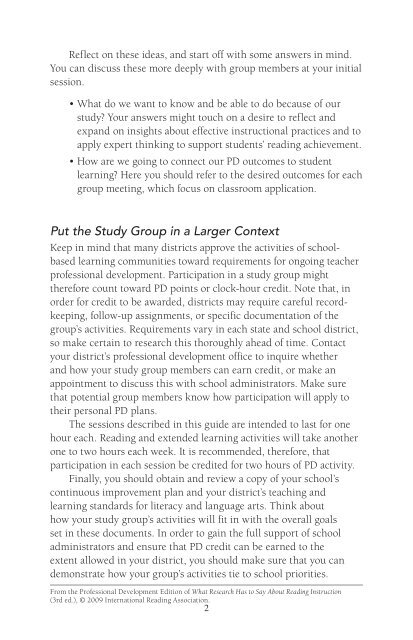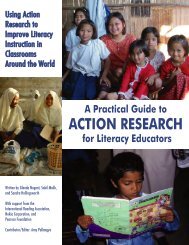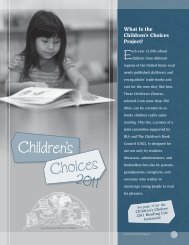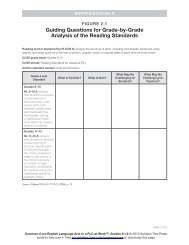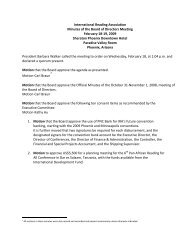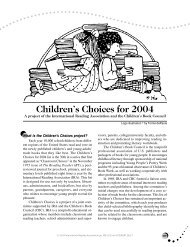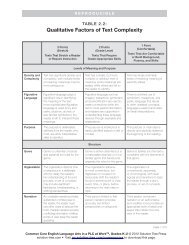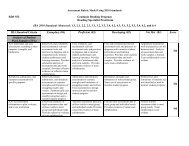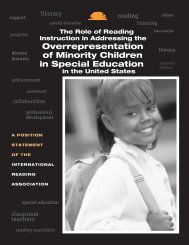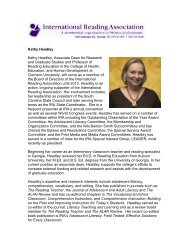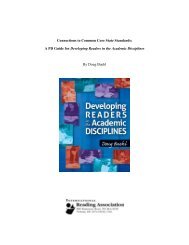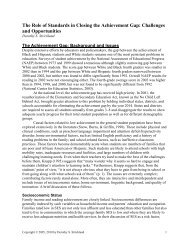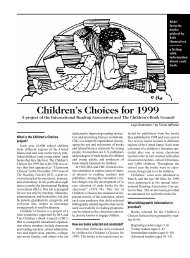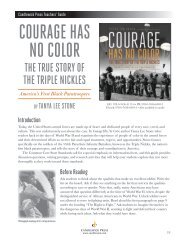What Research Has to Say About Reading Instruction - International ...
What Research Has to Say About Reading Instruction - International ...
What Research Has to Say About Reading Instruction - International ...
Create successful ePaper yourself
Turn your PDF publications into a flip-book with our unique Google optimized e-Paper software.
Reflect on these ideas, and start off with some answers in mind.<br />
You can discuss these more deeply with group members at your initial<br />
session.<br />
• <strong>What</strong> do we want <strong>to</strong> know and be able <strong>to</strong> do because of our<br />
study? Your answers might <strong>to</strong>uch on a desire <strong>to</strong> reflect and<br />
expand on insights about effective instructional practices and <strong>to</strong><br />
apply expert thinking <strong>to</strong> support students’ reading achievement.<br />
• How are we going <strong>to</strong> connect our PD outcomes <strong>to</strong> student<br />
learning? Here you should refer <strong>to</strong> the desired outcomes for each<br />
group meeting, which focus on classroom application.<br />
Put the Study Group in a Larger Context<br />
Keep in mind that many districts approve the activities of schoolbased<br />
learning communities <strong>to</strong>ward requirements for ongoing teacher<br />
professional development. Participation in a study group might<br />
therefore count <strong>to</strong>ward PD points or clock-hour credit. Note that, in<br />
order for credit <strong>to</strong> be awarded, districts may require careful recordkeeping,<br />
follow-up assignments, or specific documentation of the<br />
group’s activities. Requirements vary in each state and school district,<br />
so make certain <strong>to</strong> research this thoroughly ahead of time. Contact<br />
your district’s professional development office <strong>to</strong> inquire whether<br />
and how your study group members can earn credit, or make an<br />
appointment <strong>to</strong> discuss this with school administra<strong>to</strong>rs. Make sure<br />
that potential group members know how participation will apply <strong>to</strong><br />
their personal PD plans.<br />
The sessions described in this guide are intended <strong>to</strong> last for one<br />
hour each. <strong>Reading</strong> and extended learning activities will take another<br />
one <strong>to</strong> two hours each week. It is recommended, therefore, that<br />
participation in each session be credited for two hours of PD activity.<br />
Finally, you should obtain and review a copy of your school’s<br />
continuous improvement plan and your district’s teaching and<br />
learning standards for literacy and language arts. Think about<br />
how your study group’s activities will fit in with the overall goals<br />
set in these documents. In order <strong>to</strong> gain the full support of school<br />
administra<strong>to</strong>rs and ensure that PD credit can be earned <strong>to</strong> the<br />
extent allowed in your district, you should make sure that you can<br />
demonstrate how your group’s activities tie <strong>to</strong> school priorities.<br />
From the Professional Development Edition of <strong>What</strong> <strong>Research</strong> <strong>Has</strong> <strong>to</strong> <strong>Say</strong> <strong>About</strong> <strong>Reading</strong> <strong>Instruction</strong><br />
(3rd ed.), © 2009 <strong>International</strong> <strong>Reading</strong> Association.<br />
2


